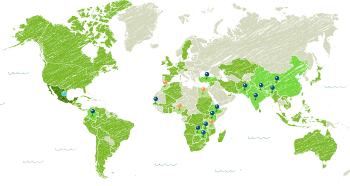CIMMYT’s accomplishments in 2023 show how agriculture can mitigate climate change, and adapt to it. CIMMYT is working with leaders in Africa to confirm the crop traits that farmers there will need to adapt to climate change. CIMMYT’s groundbreaking work on wheat anticipates how warmer nights will rob the crop of its yield. Genetic advances will help future plant breeders develop maize that releases less nitrogen into the atmosphere. CIMMYT and partners are breeding maize varieties that improve nutrition, by avoiding anemia and vitamin A deficiency. As a global thought leader, CIMMYT is helping farmers to nourish the world in the midst of a climate crisis, ensuring food and nutrition security, especially for vulnerable regions of the Global South.
CIMMYT is transforming agrifood systems to become climate-smart, resilient and inclusive. For example, fostering collaboration between machine manufacturers and farmers in India and in Benin to co-design the equipment that smallholders need to make farming an attractive career. This international partnership is a systemic change, to meet smallholder farmers’ needs for innovation in the future. Pakistani farmers are now planting heat-adapted wheat varieties on a massive scale, transforming the country’s agrifood system towards self-sufficiency in cereals. In India and Mexico, wheat and maize farmers are transforming their agrifood systems with conservation agriculture, to improve soil fertility, save water, and produce more food while adapting to climate change. Breeding and delivering the latest maize hybrids require new national
seed systems, as CIMMYT and partners are building in Bhutan. Systems thinking is necessary to link producers with seed supplies, machinery, and markets, as is being explored with a farmers’ hub in Nigeria.

At the Rio+20 Conference, in June 2012, the United Nations (UN) member states agreed to develop Sustainable Development Goals (SDGs), to build on the eight Millennium Development Goals (MDGs) that had been established in 2000, but were slated to expire in 2015. The UN High-level Political Forum on Sustainable Development held its first meeting on 24 September 2013 to follow up on these SDGs.
Ten of the 17 SDGs relate directly to CIMMYT’s mandate. The SDGs guide agricultural, social and economic development until 2030. The entire CGIAR has transformed its work to align with these ambitious goals.
CIMMYT’s research for development contributes to a world free of poverty, hunger and environmental degradation. CIMMYT, as part of CGIAR, is striving to help the world reach these goals, such as the empowerment of women, the reduction of greenhouse gas emissions, and the improvement of health and nutrition for the world’s poorest people.
CIMMYT contributes to reaching the following SDGs:










The CIMMYT is an international organization focused on non-profit agricultural research and training that empowers farmers through science and innovation to nourish the world in the midst of a climate crisis. Applying high-quality science while building strong partnerships, CIMMYT works to achieve a world with healthier, more prosperous people, free from hunger, and with more resilient agrifood systems. CIMMYT’s research brings greater productivity and higher profits to farmers, while mitigating climate change and reducing the environmental impact of agriculture. Besides maize and wheat, CIMMYT now also works with dryland crops like sorghum, millets, and legumes, to modernize seed production in Africa, while engaging with farmers and breeders.
CIMMYT is a member of CGIAR, a global research partnership for a food-secure future, dedicated to reducing poverty, enhancing food and nutrition security, and improving natural resources.
For more information, visit:
With projects in 88 countries, CIMMYT collaborates with hundreds of partners and is part of the global network of CGIAR Research Centers, delivering science for a food and nutrition secure future.


88 COUNTRIES
WHERE WE HAVE
PRESENCE*
HEADQUARTERS
OFFICE
SATELLITE OFFICE
Afghanistan
Algeria
Angola
Australia
Argentina
Austria
Bangladesh
Benin
Bhutan
Bolivia
Botswana
Brazil
Burkina Faso
Burundi
Cambodia
Cameroon
Canada
Chile
China
Colombia
Congo
(Brazaville)
Costa Rica
Cote d'Ivoire
Cuba
DRC
Ecuador
Egypt
El Salvador
Eswatini
Ethiopia
France
Germany
Ghana
Guatemala
Honduras
India
Indonesia
Iran**
Ireland
Israel
Japan
Kazakhstan
Kenya
Laos
Lesotho
Madagascar
Malawi
Malaysia
Maldives
Mali
Mauritus
Mexico
Morocco
Mozambique
Myanmar
Namibia
Nepal
Nicaragua
Nigeria
Pakistan
Panama
Peru
Philippines
Rwanda
Senegal
Singapore
Spain
South Africa
South Sudan
Sri Lanka
Sudan
Suriname
Sweden
Switzerland
Syria
Tanzania
Trinidad & Tobago
Turkey
UAE
USA
Uganda
United Kingdom
Uruguay
Uzbekistan
Venezuela
Vietnam
Zambia
Zimbabwe